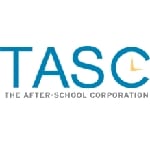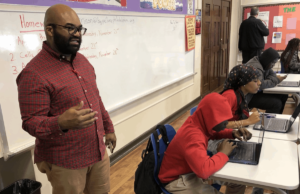Q&A: ExpandED Principal Discusses Extended School Days
 This December, The After-School Corporation (TASC) launched an initiative to take its ExpandED Schools program to the national stage. ExpandED Schools connects schools to community organizations in order to provide students with increased learning opportunities in the community through an extended school day. At Thurgood Marshall Academy Lower School (TMALS) in Harlem, an ExpandED School, Principal Dawn Brooks DeCosta discusses her experience with the program.
This December, The After-School Corporation (TASC) launched an initiative to take its ExpandED Schools program to the national stage. ExpandED Schools connects schools to community organizations in order to provide students with increased learning opportunities in the community through an extended school day. At Thurgood Marshall Academy Lower School (TMALS) in Harlem, an ExpandED School, Principal Dawn Brooks DeCosta discusses her experience with the program.
Q: What inspired the ExpandED Schools program?
A: My school, Thurgood Marshall Academy Lower School in Manhattan, was invited by TASC to be one of the schools that piloted the initiative beginning in the 2008-09 school year. It’s been so successful here that we were happy to be a part of the national initiative TASC launched at the start of this school year.
All ExpandED Schools partner with a community organization to expand learning time, and that fits directly with our conviction that communities need to be partners with their schools. Our ExpandED partner is Abyssinian Development Corporation (our school was founded by Abyssinian in collaboration with the NYC Department of Education and New Visions for Public Schools). We were interested in expanding the day for all kids because we know they need that additional time for healthy movement, for a healthy snack at the end of the day and for enrichments.
We value having the additional time with our children to deepen their understanding and provide more enrichment activities that address all of our learning styles. We can give struggling students extra help and advanced students greater challenges that keep them interested.
Our program has grown since its inception. We now offer academic focus days that run until 5:15 p.m. where teachers are able to remain with their students to reinforce the day curriculum and provide additional supports. We have a variety of enrichments that include a visual arts and literacy program where students have several exhibits throughout the year. We also offer West African Dance, a Girls Step team, sports, African drumming, Reader’s Theatre, chorus, Math Buddies Technology Program, tap dancing and Yoga/Relaxercise. The older students are able to choose enrichments based on their interests and talents.
Q: What key challenge did ExpandED seek to target with its extended school day program?
A: Together with our community partner, we look carefully at all the data we have on students, starting with achievement data, but we also look at students’ attendance, behavior, and areas of particular interest. What kinds of activities would really engage them? Then we plan together how to use additional learning time and staff to meet those challenges.
Last school year we focused particularly on language arts, math and science. This year, since we have experienced great gains on the NYS assessments, we will continue with this same focus. Schoolwide our ELA scores increased by 15 percent and our Math Scores increased by 20 percent. We believe our successes have a great deal to do with our ExpandED school day and the additional supports it provides.
This school was founded with a focus on arts and the rich cultural history of Harlem, so it’s great to have the additional time and staff to devote to arts education. Another focus of our program is self-esteem and character building. ExpandED has been instrumental in providing more opportunities for students to explore their individual talents and interests and find confidence in their unique abilities. This gain in self-esteem has shown up in our academic performance as well as our total school culture.
Q: Were there any positive effects that occurred from the extended school day that were not originally intended or predicted?
A: The desire to improve science instruction was a driving factor in becoming an ExpandED School. We didn’t anticipate how much our classroom teachers would appreciate the less formal, hands-on science curriculum we introduced in the hours after 3 p.m. with support from TASC. They found it so engaging that they’ve brought many of those hands-on activities into the school day. There’s not enough conversation about science in our community and we want our students to understand this is a subject they can master and pursue into careers.
Q: What makes an extended school day program most successful?
A: You need a strong partnership with the community organization, including day-to-day communication. You need to communicate with parents and make sure they have a voice and are involved. We appreciate having a strong framework for planning and implementing the curriculum. It’s important to include both teachers and the community educators in professional development. A seamless transition from day to evening is key in maximizing the instructional minutes available. The staff hired is a very important part of the formula. Having staff members who are committed to excellence and who hold our core values in high esteem is necessary.
Q: What challenges do communities face in terms of policy, resources, etc.?
A: We’re all struggling in this budget environment. This year alone we lost over $80,000 of our budget. In a small school, this is critical. Without ExpandED Schools we would not be able to provide all of the support and resources necessary for our children to achieve and do well. Right now, private investment by foundations and others is critical to developing and testing models for expanding the school day, but ultimately we have to find a way to sustain this largely through public funding. ExpandED Schools blend education and youth development funding. But it’s hard to build long-term sustainability when you have to draw on a patchwork of different local, state and federal funds every year. It would be helpful if public agencies could streamline their funding and reporting requirements and get on the same funding schedules so we could spend less time dealing with those administrative tasks and more time concentrating on instruction.
Q: How can local community members support ExpandED?
A: Parent voice is important. If this is something your community needs, make it known to your local and school leaders. Professionals can volunteer to mentor students, they can give them exposure to careers and opportunities beyond their neighborhoods, and they can support us financially by donating to our nonprofit community partners and they can support reasonable school budgets.
This Q&A with Dawn Brooks DeCosta was edited and condensed by Sarah Cargill.




0 Comments
Leave a Comment
Your email address will not be published. All fields are required.